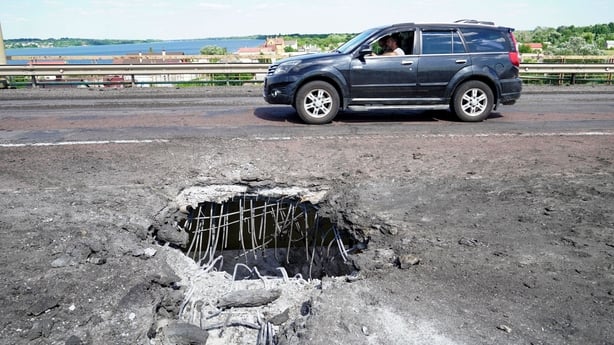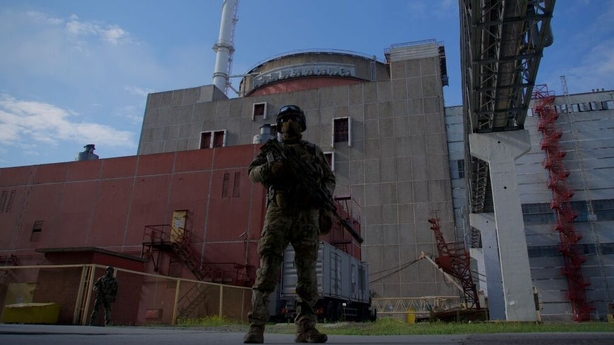Ukraine's president has called on the West to impose a blanket travel ban on Russians, an idea that has found support among some EU member states but angered Moscow which pressed on with a fierce military offensive in eastern Ukraine.
Volodymyr Zelensky's idea looked likely to divide the European Union, where differences on how to deal with Moscow have long persisted between some of its eastern and western members and came as Ukraine halted flows of Russian oil to some eastern European countries due to a sanctions-related payment issue.
Mr Zelensky's call for a one-year travel ban and the apparent expulsion of Russians living in the West so that they could live "in their own world until they change their philosophy" was made in an interview with the Washington Post.
He complained that sanctions imposed so far on Russia to punish it for invading his country on 24 February were too weak.
"Which ever kind of Russian ... make them go to Russia," President Zelensky was quoted as saying.
"They'll understand then," he said. "They'll say, 'This (war) has nothing to do with us. The whole population can't be held responsible, can it?' It can."
Mr Zelensky was quoted as saying the ban should also extend to Russians who had fled since the start of what Moscow calls a "special military operation" because they disagreed with President Vladimir Putin.

The Kremlin dismissed Mr Zelensky's words as irrational, saying that Europe would ultimately have to decide if it wanted to pay the bills for his "whims".
"Any attempt to isolate Russia or Russians is a process that has no prospects," said Kremlin spokesperson Dmitry Peskov.
Other senior Russian officials have questioned the legality of implementing such restrictions under international law, suggesting they would infringe Russians' human rights.
There was support though from Kaja Kallas, Estonia's prime minister, who said she thought it was time for the EU to stop issuing visas to Russians that allow them to visit the 27-nation bloc.
"Visiting Europe is a privilege, not a human right," Ms Kallas wrote on Twitter.
Finnish Prime Minister Sanna Marin said yesterday that she also favoured an EU-wide curb on Russian tourism and that EU leaders were likely to discuss the issue at their next summit.
"It is not right that while Russia is conducting an aggressive and cruel attack in Europe, Russians can live a kind of normal life, travel in Europe, be tourists," Ms Marin told Finnish public broadcaster Yle.
While Finland still issues Schengen visas to Russian tourists, Estonia, Latvia and Lithuania no longer do.
The Schengen area comprises 26 European countries among which people can travel freely without presenting passports.
Latvia has said it also favours an EU-wide ban.
Other countries which have traditionally enjoyed closer ties to Russia such as Hungary are however likely to oppose an EU-wide travel ban and the European Commission has questioned the feasibility of a blanket ban, saying that certain categories of people such as family members, journalists and dissidents should always be granted visas.
Russia meanwhile unleashed ground forces, air strikes and artillery as it pressed ahead with a grinding offensive designed to complete its capture of eastern Ukraine, but Kyiv said its troops were putting up fierce resistance and largely holding the line.
Heavy fighting was reported today in frontline towns near the eastern city of Donetsk, where Ukrainian officials said Russian troops were launching waves of attacks as they tried to expand their control of the industrialised Donbas region.
The Ukrainian military said it had repelled ground assaults in the direction of the cities of Bakhmut and Avdiivka.
Russia gave a different assessment.
Chechen leader Ramzan Kadyrov claimed his forces had captured a factory for Moscow on the edge of the eastern town of Soledar, other Russian-backed forces said they were in the process of "clearing out" the heavily fortified village of Pisky, and Russian media reported that a group of mercenaries from the Wagner Group had dug in near the city of Bakhmut.
Reuters could not verify either side's battlefield accounts.
British military intelligence, which is helping Ukraine, said that Russia's push towards the city of Bakhmut had been its most successful operation in the Donbas in the last 30 days, but said it had still only managed to advance around 10km.
It said Russian forces in other areas had not gained more than 3km over the same period.

Russia, as part of what it calls its "special military operation", has said it plans to seize full control of the Donbas on behalf of pro-Kremlin separatist forces, while Russian-installed officials in parts of southern Ukraine have said they plan to press ahead with referendums to join Russia.
Ukraine, which says Russia is prosecuting an unprovoked imperial-style war of aggression, is banking on sophisticated Western-supplied rocket and artillery systems to degrade Russian supply lines and logistics.
Russia says ammunition detonated at Crimea base, one dead
Elsewhere, ammunition detonated at an airfield in Moscow-annexed Crimea, killing one person and wounding several more, Russian officials said.
"Several aviation munitions detonated" near the settlement of Novofyodorovka, the defence ministry said in a statement carried by Russian news agencies.
"As a result of the explosion no one was hurt."
The Russian defence ministry said it was looking to establish the reason for the explosions but indicated that the airfield was not targeted in an attack.
According to dramatic footage on social media, holidaymakers left the local beach in panic as large plumes of black smoke billowed into the sky. Cars rushed to leave Novofyodorovka, as ambulances were dispatched to the scene.
Crimea borders the southern Ukrainian region of Kherson, now controlled by Moscow, and the southeastern region of Zaporizhzhia, partially occupied by the Russian army, is also nearby.
In a video statement, Crimea head Sergei Aksyonov, speaking from the scene, said the affected area had been cordoned off.
"All necessary measures have been tightened to ensure the safety of infrastructure facilities and the population," he said.
Crimea, which was annexed by Moscow from Ukraine in 2014, is a popular tourist destination.

